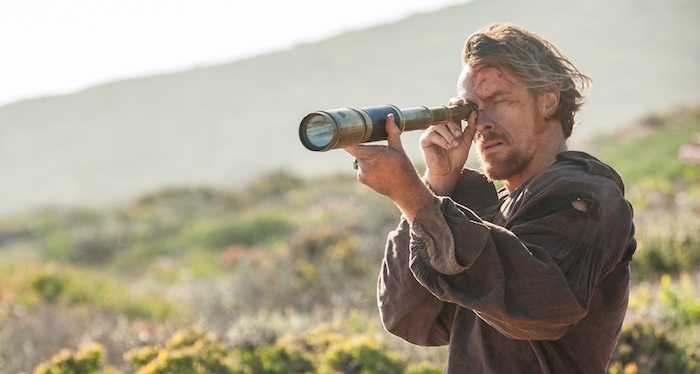Amazon Prime UK TV review: Black Sails, Season 2
Review Overview
Pillaging
8Politics
8David Farnor | On 23, Jan 2016
“What’s the target, Captain?”
The strength of Black Sails has always been its complexity. Rather than settle for being a Pirates of the Caribbean knock-off, it strives to plunder waters with more depth. And so, Season 1 gave us the impending mutiny of Captain Flint’s crew and the beginnings of a civilised shipping port in Nassau, under the eye of Eleanor Guthrie (Hannah New). On the plus side, nautical antics and a slippery John Silver. On the down side, the most detailed on-screen trade disputes since Star Wars Episode I: The Phantom Menace. What’s the target? You weren’t always convinced it knew.
Season 2 finds us back in those same waters – but with a confident, new steer on where the treasure is to be found. Shot with the usual eye for beautiful, Caribbean landscapes, we begin where last season left off, with Flint cast out and his boat sunk by a Spanish ship just off the island where the golden horde of the legendary Urca de Lima lies. Stranded on dry land, Flint’s (Toby Stephens) only ally is John Silver (Luke Arnold). Oh yes, he’s in a briny pickle, all right.
“There is simply no way of stealing that gold,” says Flint, a sign that another harebrained scheme is already on the tip of his tongue: steal that Spanish boat instead. After the long, drawn-out quest to track down the infamous, gold-stuffed vessel, it’s a refreshing wind change to have a simple, achievable goal.
The whole of the second season has that same breezy quality, breaking down an over-arching plot of double-crosses and back-stabbing into straight-forward steps. One moment, it’s stealing a boat. The next moment, it’s taking control of the captain’s table. Very quickly, a rhythm builds that carries us through all 10 episodes and that proverbial tide waits for no man.
The wonderful Arnold and the grizzled Stephens revel in their roles as the odd couple, with Silver constantly weaselling his way out of trouble with a boy band-worthy grin. After the whole of Season 1 in their company, they make a likeable pair: Stephens is still treating his pirate as an ‘ard man rather than an “arrr”-d man, while Arnold has repeatedly demonstrated that his cook is not to be trusted.
Together, they bring some much-needed laughs to the action; if Black Sails has impressed with its ambitions, it has previously suffered from not always embracing its happy side. (After The Pirates! In an Adventure with Scientists, for example, you wonder why Captain Flint and his crew never celebrate Ham Night.)
But the darkness of Season 2 builds smartly upon the first run, with the immediate introduction of a new pirate: the nefarious Ned Low. Played by Tadhg Murphy with a menacing nonchalance, he wastes an entire crew without blinking, before strolling into Nassau and confronting Eleanor. Compare him to Zane McGowan, who returns as the bitter, vengeful Captain Vane, and one appears sinister while the other initially seems more snivelling – but McGowan gradually steals the screen back from the newcomer, reminding us that he’s a villain who isn’t afraid to shiver some timbers. There’s a physicality to Zane’s Vane that makes him intimidating when you put him next to the right person; placed along Murphy’s Ned and Vane’s reappearance in Nassau, with his own play for power, becomes far more interesting.
The show’s strongest player, though, turns out to be another person entirely: Captain Rackham. Toby Schmitz gets more and more screen-time now that he and Vane have parted ways and he wastes no time in making the most of it. He moves from camp and pathetic to sympathetic and funny – he’s the kind of pirate who seems more concerned with the way his flag looks than his ship. He’s surrounded by two equally fascinating characters: Anne Bonny (Clara Paget) and Max (Jessica Parker Kennedy).
Kennedy’s manipulative prostitute seduces her way between the two mates, trying to twist them both to her own ends. The psychological power play that arises from their mental threesome actually elevates the love triangle from the level of trashy sex; Paget brings a believable bond with Schmitz to bear on their steamy subplot, while the electric Kennedy has chemistry with anything that’s within a 10-metre radius. From buying leads and bumping off clients, the three brothel-based rogues almost turn out to be the smartest people in the show.
It’s that kind of detail that helps Black Sails’ second run conquer the complexity that initially held back the first. The show’s sheer cast size has attempted to present the seafaring jostle for superiority as something closer to Game of Thrones than Cutthroat Island. If that hasn’t been entirely successful up until now, here, it pays off, as Roland Reed’s haplessly straight-laced Dufresne skilfully steers us through the mutinous waters and Tom Hopper’s nuanced performance as Billy Bones constantly questions the notion of loyalty that lies at the heart of the show.
Most impressive of all, perhaps, is the way the writers find uncharted territories of Toby Stephens’ Flint to chart, taking us back into his past. Last season, Miranda Barlow (Louise Barnes) kept popping up with talk of pardons and what-not, a scandal that unsettled the locals back on Guthrie’s grounds. But for all the writers’ attempts to bridge Flint’s back-story with the bigger picture, the sailing was never smooth. Here, we follow Flint’s rise as a Royal Navy Officer years ago in London. It’s nice to see Stephens out of his usual, grubby outfit – he sure does scrub up well – but we get answers rather than rumours about the man behind the scowl. Miranda’s relationship with him becomes far more layered – and, as we meet Rupert Penry-Jones’ Thomas Hamilton, far more intimate – than we might have expected. When Eleanor questions Captain Flint’s demons, Barlow snaps back with pained authority: “I know their names. I was there when they were born.”
Their connection feeds into Flint’s partnership with Guthrie, as both find themselves dealing with challenges to their authority. Season 1 saw Flint’s crew slowly overthrow their tyrannical leader. Season 2 gives us Flint as the underdog trying to win back respect. Eleanor, meanwhile, is tied between Vane’s brutal governing of Nassau and Flint’s reckless commitment to the piratical cause. She must choose who to trust: a homicidal maniac or a homicidal maniac.
As useful hostages come into play, New’s resourceful businesswoman proves as hard to pin down as the rest of them, each one scheming to survive and stay one step ahead of the others. But there’s an intriguing balance in their opposing views: Flint will sacrifice anyone to achieve his aims; Guthrie, on the other, won’t. The result is an exciting yet thoughtful study of how a pirate becomes a legend – it’s telling, after all, that Flint, Rackham and Silver are the few members of the ensemble to be household names. (The prospect of Blackbeard arriving in Season 3 is a tantalising one, indeed.)
As contenders to the Nassau throne rise and fall, a string of uneasy truces and violent negotiations, that expansive cast is culled to a core ensemble that allows Black Sails to think big but narrate small. It’s a skill demonstrated brilliantly in the season’s second episode, as Silver and Flint both take drastically different approaches to getting back in their crew’s good books – something that’s spelled out in a swift, stylish set piece.
That’s not to say there aren’t engaging exchanges to be heard. “The more they need you, the more you need them, and it drives us to do the most unlikely things,” observes Flint, during a brief moment of downtime with his number two. But Black Sails is at its best when combining emotions and politics with action sequences. Does it take fear or respect to command a crew? For Flint, it’s a borderline sociopathic ruthlessness to do what it takes, and he puts that into action again and again. The season’s climax, meanwhile, takes place not on ships, but on land, as buildings crumble and crowds run – it’s possibly the show’s most spectacular stunt yet – but our focus remains on two men working together.
Pirates of the Caribbean made much of its brotherly code, which was really more a set of “guidelines”. If Black Sails treated the idea a little too seriously in Season 1, this consistently thrilling second season proves that it can still have fun. Politics is one thing, but when there’s pillaging and looting, Black Sails knows how to shrug it off and band together. “What’s the target, Captain?” asks one, as Flint stands poised to take on the rest of the world. “Whatever’s left,” he snarls. That Game of Thrones comparison suddenly doesn’t seem so far off after all.
Black Sails Season 1 and 2 are available on Amazon Prime Video, as part of a £5.99 monthly subscription. Season 3 is available to watch online in the UK on Amazon from 24th January.


















